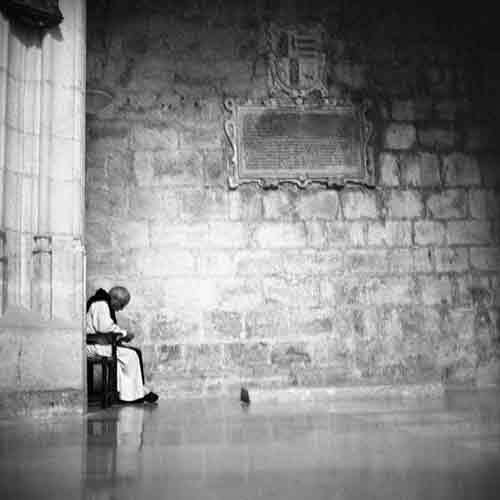
This time may be an invitation to you to explore and deepen the individual spiritual disciplines and practices that are a rich (and often neglected) part of the Christian heritage.
Day by day, because of coronavirus, we are seeing services cancelled, with no public worship services taking place for the foreseeable future. People are providing services digitally: recorded sermons, live-streamed Eucharists, and so forth.
Such a church presence digitally is great; it’s a way of continuing a sense of community in these strained times. And you know I think Christian churches should be agile online. [That doesn’t mean that I think that every little community should be streaming – there’s many creative ways of having a digital presence in this millennium; have an online presence and do what you do do well.]
So, having affirmed the value of streaming and continuing community, I want to now complement this by stressing that this, for many, may be an encouragement, inspiration, and challenge to explore the great Christian spiritual tradition valuing solitude.
Being Lent, we can start with the Ash Wednesday Gospel reading which sets the frame for Lent:
Jesus said: whenever you pray, go into your room and shut the door and pray to your Father who is in secret; and your Father who sees in secret will reward you.
Matthew 6:6
Christianity has spiritual disciplines, healthy habits, emphasised in Lent, which flourish in solitude.
You could take up praying the Daily Office (also called the Prayer of the Church, and Daily Prayer). You could try meditation (‘Christian Meditation’, or ‘Centering Prayer’). Or ‘Lectio Divina‘ (praying with the Bible); Or the ‘Examen‘ or ‘Spiritual Exercises’ of St Ignatius Loyola. There is plenty on this site about these disciplines and practices (use the search box), and you can search further online, or get a book about these practices to help you.
Let me share with you ‘The Brief Rule’ of the 11th Century Saint Romuald of Ravenna. Romuald renewed monastic life and the life of hermits. Today, Camaldolese follow his charism – that includes vowed nuns and monks and also people living ordinary lives in the world, called ‘oblates’. Here is The Brief Rule:
Sit in your cell as in paradise.
Put the whole world behind you and forget it.
Watch your thoughts like a good fisherman watching for fish.
The path you must follow is in the Psalms – never leave it.
If you have just come to the monastery,
and in spite of your good will you cannot accomplish what you want,
take every opportunity you can to sing the Psalms in your heart
and to understand them with your mind.
And if your mind wanders as you read, do not give up;
hurry back and apply your mind to the words once more.
Realise above all that you are in God’s presence,
and stand there with the attitude of one who stands
before the emperor.
Empty yourself completely and sit waiting,
content with the grace of God,
like the chick who tastes nothing and eats nothing
but what his mother brings him.
Finally, here is an article by Sister Mary Catharine Perry, a cloistered nun with the Dominican nuns in Summit (NJ, USA). She writes that although she and the 17 nuns she lives with don’t call it that, “For the past 29 years, I’ve chosen to practice social distancing.” With few exceptions, they never leave the monastery complex. Her advice: you need to establish structure; be intentional and love others; and use this time for self-reflection and relaxation.


